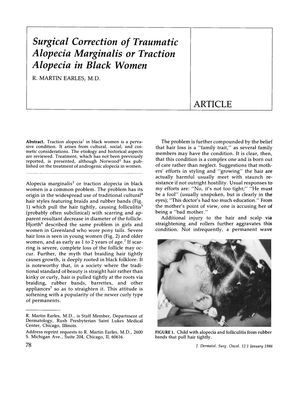Surgical Correction of Traumatic Alopecia Marginalis or Traction Alopecia in Black Women
January 1986
in “
The Journal of Dermatologic Surgery and Oncology
”

TLDR Surgical correction can treat hair loss in black women caused by styling practices, with techniques chosen based on individual needs and hair loss severity.
In 1986, R. Martin Earles, M.D., addressed the issue of traction alopecia in black women, attributing it to hair styling practices that cause damage to hair follicles. Earles presented surgical correction as a viable treatment, utilizing the Orentreich technique for grafting and a modified Juri Flap for enhanced hair density. He outlined the pros and cons of each method, such as the simplicity and scarring risk of grafts versus the complexity and improved density of flaps. Treatment was tailored to the individual, considering the severity of hair loss, patient preferences, and scalp flexibility, with some cases requiring a combination of techniques. Earles recommended surgical intervention after the teenage years and indicated that all stages of alopecia, which he categorized into four stages, could potentially be treated with grafts and/or flap rotations.



